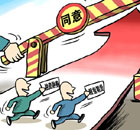Society
Real-name train ticket ends in S. China
(Xinhua)
Updated: 2010-02-15 10:03
 |
Large Medium Small |
As the bell struck midnight Saturday to usher in the New Year, a real-name train ticket selling experiment ended in southern China's Guangdong province.
The move has turned out to be helpful in easing ticket shortages during a travel peak season before the Spring Festival, or Chinese Lunar New Year, but failed to uproot scalpers.
In 15 days, the operation initiated by the Ministry of Railways among nine stations run by Guangzhou Railway Group has benefited 600,000 travellers who went on their journeys home from Guangdong since January 30 to inland provinces of Hunan, Sichuan and Guizhou, and Chongqing municipality.
The stations were in cities whose economy heavily relies upon migrant workers, including Guangzhou, Shenzhen, Foshan, Dongguan and Huizhou, all in Guangdong, known as "Factory of the World".
With the real-name ticket selling scheme, gone were those long waiting queues -- which had been ubiquitous before the experiment-- at the entrances of Guangzhou Railway Station where transportation task is usually the heaviest around important traditional festive seasons such as Spring Festival.
Xiong Xiaoyan, who was heading for her home province of Guizhou, southwest China, was surprised to find the ticket-checking process taking only 10 seconds.
"I thought the waiting line would be much longer than normal as the identity card check was supposed to take more time", she said, "I didn't expect it to be so prompt!"
Huang Xin, director of the passenger transport section of the Guangzhou Railway Group, attributed the efficiency to the improved ticket check-in infrastructure. "We used to have only seven to eight ticket gates. Now the number has grown up to 108," Huang said.
Huang said that this year's pre-Spring Festival single-day traffic record had overtaken that of last year to 232,000 people on February 28.
"I think the pilot operation has successfully passed the ticket check-in test as the extra procedure aiming to secure fairness cut rather than prolong travelers' waiting time," said Huang.
Dozens of train stations in Hunan, Sichuan, Chongqing and Guizhou, home to a huge number of migrant workers, started to pilot the real-name train ticket selling scheme on Sunday.
Tens of millions of migrant workers go back home before the Spring Festival for often once-in-a-year family reunions. They return to cities after the festival.
The scheme runs through March 10.
Scalpers cornered not uprooted
Before the name-based system was adopted, travellers had long complained about scalpers worsening the ticket shortage problem by stockpiling tickets and reselling them at higher prices as the country's railway transport capacity falls far short of its annual Spring Festival traffic demand.
During this travelling season from January 30 to March 10, the railways were expected to transport 210 million passengers, up 9.5 percent year on year, or 5.25 million passengers per day, according to the Ministry of Railways.
Migrant worker Wang Xiangneng from central Hunan province thought the real-name system had put a curb on scalpers. "Anyone can buy a ticket either by phone calls or at ticket booths now. It is really first-come and first-served," said Wang.
Taking himself as example, Wang said that a one-way ticket for a hard seat from Guangzhou to Shaoyang priced at 51 yuan used to be sold at least 200 yuan by scalpers in the past.
"If we were able to secure a ticket from the station or authorized outlets, we could have several days' pay spared. That is not a small amount for us," he said.
But there are people always trying to beat the new system to make illegal profits. Police in Guangdong have captured 837 illegal ticket vendors and confiscated more than 2,500 scalped tickets by February 8.
In Chongqing, local police have also cracked down on several ticket scalping cases.
From two suspects, the police have seized 37 real-name tickets, 115 IDs for ticket booking via phone calls and four household registration booklets. The two suspects surnamed Wang and Gou separately confessed they would charge an extra 20 to 30 yuan for each ticket.
Yue Jinglun, director of the Social Policy Research Institute of the Guangzhou-based Sun Yat-sen University, said there was much to be done to prevent the real-name system from being taken advantage of by scalpers.
"No one would deny that the trial operation has been a very positive step in securing fair distribution of scarce train ticket resources. The key is to constantly optimize the system, rather than abandoning it for fear of defects," he said.
Huang Xin said the way to tackle train ticket shortage problem from the root was to expand the country's railway transport capacity. "At the core this is supply-and-demand problem," he said.











